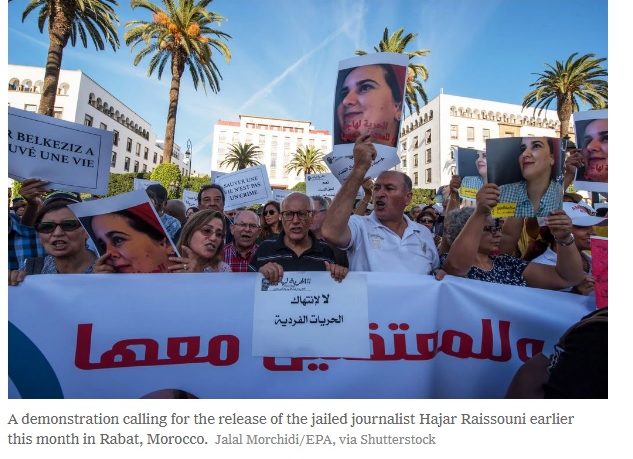New York Times
Credit Jalal Morchidi/EPA, via Shutterstock
By Aida Alami
The journalist, Hajar Raissouni, was arrested with her fiancé as they were leaving a gynecologist’s office in the capital last August.
A demonstration calling for the release of the jailed journalist Hajar Raissouni earlier this month in Rabat, Morocco.
Morocco’s king pardoned Hajar Raissouni, a journalist for an independent newspaper who was sentenced to a year in prison for an abortion that she denied having, the country’s ministry of justice said on Wednesday.
The ministry characterized the pardon as an act of “compassion and mercy,” saying that King Mohammed VI wanted to “preserve the future of the two fiancés who planned to found a family in accordance with religious precepts and the law.”
But human rights advocates said that Ms. Raissouni’s conviction was unjust and politically motivated, and that it exemplified the state’s persecution of independent journalists. The king also pardoned her fiancé, two doctors and an office assistant.
The case sparked weeks of outrage in the North African kingdom, with many speaking out in defense of press freedoms and others asking for reforms to the penal code. Ms. Raissouni and her fiancé, Rifaat al-Amin, had been sentenced to one year in prison.
“We’re relieved that Hajar and her co-defendents are free, but they should have never been arrested in the first place,” said Ahmed Benchemsi, communications director for Human Rights Watch’s Middle East and North Africa division. “A silver lining for this deplorable incident is that a debate was opened about archaic laws in Morocco, and now there’s a growing demand to repeal criminalization of nonmarital sex from legal books.”
Ms. Raissouni, 28, works for an independent daily newspaper, Akhbar Al Yaoum, that is critical of the state. She and Mr. al-Amin were arrested on Aug. 31 — just two weeks before their wedding — as they were leaving a gynecologist’s office in the Moroccan capital, Rabat.
They were charged with having sex outside of marriage and an abortion, both crimes in Morocco. Ms. Raissouni said she sought treatment after she had suffered a blood clot, and her co-defendants also denied that an abortion ever took place.
A physician, Dr. Jamal Belkeziz, was sentenced to two years in prison. A second doctor and an office assistant were also found guilty of taking part in the procedure, but the judge gave them suspended sentences.
“The recent release of Hajar Raissouni, her fiancé and the doctor brings about new hope for the Moroccan political and activist scene. It shows that activism and campaigning give results,” said Fayrouz Yousfi, a doctoral student and political activist behind an online campaign to free Ms. Raissouni. “Unfortunately, royal pardons cannot be the answer for all arrests that are politically motivated. Justice should be done for all activists, human rights activists and journalists who are put behind bars.”
In 2016, prison sentences were abolished for infractions to Morocco’s laws governing the press. However, press freedom watchdogs have reported that the state has been increasingly prosecuting journalists for matters unrelated to their reporting. Reporters Without Borders ranks Morocco 135th in its annual press freedom index.
According to Maati Monjib, a historian, a prominent critical voice in Morocco and a friend of the Raissouni family, the pardon was a result of an intense national and international effort to release the prisoners.
“I am very happy that Hajar has just been released,” Mr. Monjib said, adding that activists were about to increase their pressure campaign. “Several associations and personalities were meeting to create a committee for the release of Hajar.”
A version of this article appears in print on Oct. 17, 2019, Section A, Page 4 of the New York edition with the headline: King Pardons A Journalist Imprisoned In Morocco. Order Reprints | Today’s Paper |







